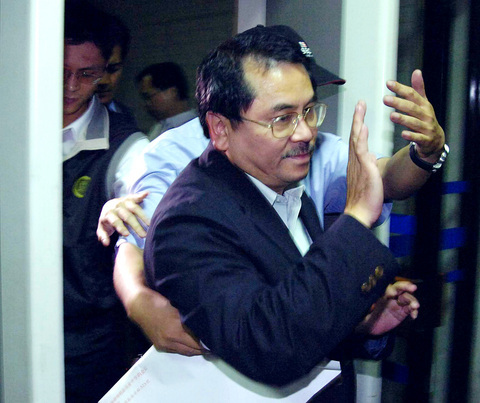With his distinctive moustache and constant grin, Lin Chung-cheng (林忠正), a heavyweight policymaking member of the Financial Supervis-ory Commission, probably never thought that he would become the focus of national attention in such an unflattering way
Investigating claims of corruption, the Taichung District Prosecutor's Office raided Lin's residence as he was brushing his teeth and preparing to go to work on Monday. Lin's office at the commission and another 12 locations across the nation were also raided as part of the investigation.
Lin has been accused of accepting goods -- including a log cabin cabin in Sijhih (汐止) -- from several financial institutions. He was also alleged to have improperly lobbied against or otherwise influenced possible penalties that the commission was considering.

PHOTO: CHAN CHAO-YANG, TAIPEI TIMES
Lin, 52, began working for the financial regulator on the invitation of former chairman Kong Jaw-sheng (龔照勝) in March last year. He was selected for his expertise in financial and economic matters.
Lin, who is known for his sense of humor, has built up an extensive network in political circles and in the business community from his work as a professor and lawmaker. He also served as the chairman of Era TV (年代電視) and as an outside director of the board of Eastern Broadcasting Co (東森電視台).
He had been reported to have somewhat reduced his participation in social functions after taking up the position with the commission because of its stringent code of conduct.
Prior to taking up the position, Lin served nine years in the legisla-ture. He also worked as the deputy secretary-general of the Democratic Progressive Party (DPP) and with the party's Justice Alliance (
Although he earned a doctorate in economics from the University of Hawaii, Lin's common touch and generous personality helped him to get along with grassroots supporters during elections.
"It is easy to make friends with the grassroot voters. You just need to drink and chat with them, comment on politics and issues in our mother language and promise you can help handle their appeals. Then you can win their support and trust," Lin once told reporters.
Lin has also excelled at invest-ing. He reportedly once had a portfolio exceeding NT$700 million (US$21 million) and reaped profits of over NT$7 million in a single real estate transaction.
He reportedly moved 10 times in the past 15 years and profited from each real estate sale.
His knowledge of investment and networking ability often led reporters to consult with him about the stock market.
Lin's multiple roles and networking also led to disputes and questions about his integrity. He was once suspected of illegally trading in Taiwan High Speed Railway Corp (台灣高鐵) shares.
Lin has been quoted as saying that he wanted to be a farmer and grow fruit on his hillside lot in Neihu after he retired.
Whether he can realize this dream depends on the final results of the current investigation.

MULTIFACETED: A task force has analyzed possible scenarios and created responses to assist domestic industries in dealing with US tariffs, the economics minister said The Executive Yuan is tomorrow to announce countermeasures to US President Donald Trump’s planned reciprocal tariffs, although the details of the plan would not be made public until Monday next week, Minister of Economic Affairs J.W. Kuo (郭智輝) said yesterday. The Cabinet established an economic and trade task force in November last year to deal with US trade and tariff related issues, Kuo told reporters outside the legislature in Taipei. The task force has been analyzing and evaluating all kinds of scenarios to identify suitable responses and determine how best to assist domestic industries in managing the effects of Trump’s tariffs, he

TIGHT-LIPPED: UMC said it had no merger plans at the moment, after Nikkei Asia reported that the firm and GlobalFoundries were considering restarting merger talks United Microelectronics Corp (UMC, 聯電), the world’s No. 4 contract chipmaker, yesterday launched a new US$5 billion 12-inch chip factory in Singapore as part of its latest effort to diversify its manufacturing footprint amid growing geopolitical risks. The new factory, adjacent to UMC’s existing Singapore fab in the Pasir Res Wafer Fab Park, is scheduled to enter volume production next year, utilizing mature 22-nanometer and 28-nanometer process technologies, UMC said in a statement. The company plans to invest US$5 billion during the first phase of the new fab, which would have an installed capacity of 30,000 12-inch wafers per month, it said. The

Taiwan’s official purchasing managers’ index (PMI) last month rose 0.2 percentage points to 54.2, in a second consecutive month of expansion, thanks to front-loading demand intended to avoid potential US tariff hikes, the Chung-Hua Institution for Economic Research (CIER, 中華經濟研究院) said yesterday. While short-term demand appeared robust, uncertainties rose due to US President Donald Trump’s unpredictable trade policy, CIER president Lien Hsien-ming (連賢明) told a news conference in Taipei. Taiwan’s economy this year would be characterized by high-level fluctuations and the volatility would be wilder than most expect, Lien said Demand for electronics, particularly semiconductors, continues to benefit from US technology giants’ effort

‘SWASTICAR’: Tesla CEO Elon Musk’s close association with Donald Trump has prompted opponents to brand him a ‘Nazi’ and resulted in a dramatic drop in sales Demonstrators descended on Tesla Inc dealerships across the US, and in Europe and Canada on Saturday to protest company chief Elon Musk, who has amassed extraordinary power as a top adviser to US President Donald Trump. Waving signs with messages such as “Musk is stealing our money” and “Reclaim our country,” the protests largely took place peacefully following fiery episodes of vandalism on Tesla vehicles, dealerships and other facilities in recent weeks that US officials have denounced as terrorism. Hundreds rallied on Saturday outside the Tesla dealership in Manhattan. Some blasted Musk, the world’s richest man, while others demanded the shuttering of his